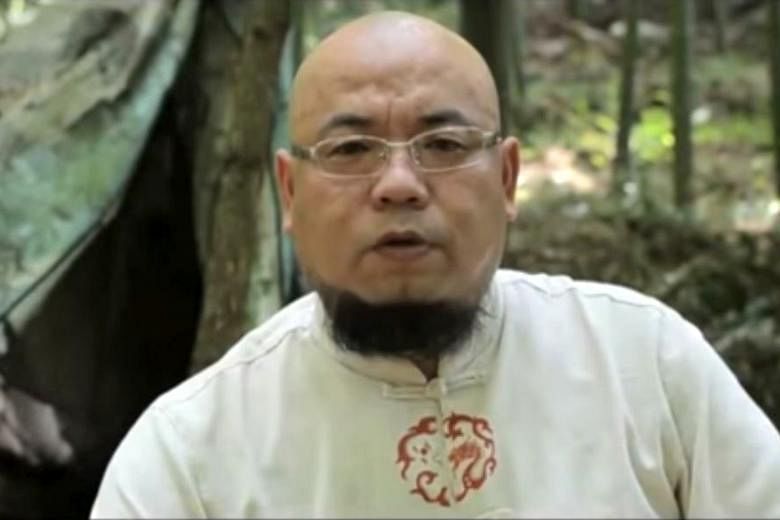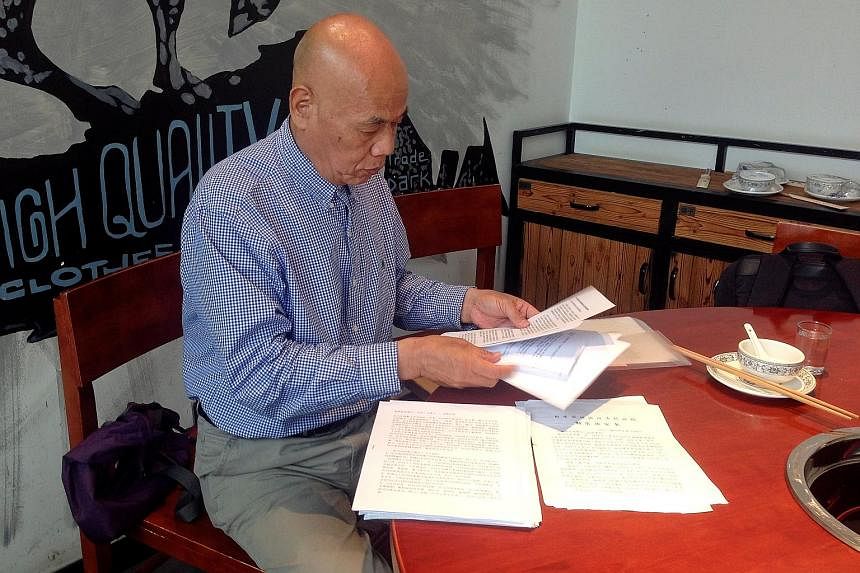BEIJING • A Chinese human rights activist who went by the online name "Super Vulgar Butcher" and made public shaming of officials a raucous art form was sent to prison for eight years after a court declared him guilty of subversion yesterday following a secretive trial.
It is the harshest sentence to be passed so far in a government crackdown on activism that began more than two years ago.
The activist, whose real name is Wu Gan, became renowned among human rights advocates for helping organise boisterous protests outside courthouses and government offices to support plaintiffs and defendants who accused officials of abusing their power.
Wu, easily recognised by his shaven head and goatee, relied on social media, a wide and fluid network of online supporters and abrasive mockery to spread his message.
The verdict underlined how under President Xi Jinping, determined activists like Wu, who once survived at the edges of official tolerance, have come under concerted attack from police, prosecutors and courts, with state news media often acting as a cheerleader.
The court in Tianjin, a port city near Beijing, where Wu was tried and convicted, said that he had "used 'rights defence' and 'performance art' as a ploy" to "seriously harm national security and social stability", according to an official summary of the verdict.
"For a long time, Wu Gan used the Internet to disseminate voluminous statements attacking state power and the constitutionally established state order, and he promoted the idea of 'toppling the wall' through subversion of state power," the court said.
Mr Yan Xin, Wu's lawyer, told Reuters he planned to appeal against the eight-year sentence handed down by the Tianjin Municipality's No. 2 Intermediate People's Court.
Government officials put a tight lid on the trial, which was held more than four months ago. Protesters were warned against turning up, and Wu's supporters and Western diplomats who went to the courthouse were enveloped by police and security guards in plain clothes, according to human rights groups monitoring the trial.
Days before the trial, Wu issued a statement saying that he would not speak during the hearing and predicting that he would receive a heavy sentence for refusing to go along with a show trial. "I will never regret what I have done and the choices I have made up to now," Wu said in the pre-trial statement that human rights groups shared online.
The Tianjin court, where Wu stood trial, said he had "acknowledged that he had violated the criminal law". But the court's brief summary did not say Wu had pleaded guilty, and it noted that his lawyers disputed the prosecution's case. Wu's defence lawyers Yan as well as Ge Yongxi refused to comment after the trial.
In addition to the eight-year prison sentence, Wu was deprived of his political rights for five years. In handing down the verdict, the court said the activist attacked state power, promoted subversion and colluded with illegal religion practitioners, vilified others on the Internet and spread rumours in the name of "safeguarding rights".
The court also said the case involved state secrets, meaning that the trial was even more restricted than usual. State security police held Wu's father, Mr Xu Xiaoshun, in his hometown in the eastern province of Fujian, according to a Twitter account that has issued statements from Mr Xu.
Wu, 45, was among 250 or more people detained in a sweeping clampdown of outspoken lawyers and rights activists that began in 2015, and he was among the last detainees from that round-up waiting to stand trial. Many of the detainees were released in days or weeks, but the government arrested and indicted a core group, mostly linked with the Fengrui Law Firm in Beijing, where Wu worked as an assistant and researcher.
At least eight people caught up in the crackdown have already been sentenced on subversion and other charges, mostly after making televised confessions and recanting their previous political stances.
Wu's sentence is the most severe yet in what rights groups have called an unprecedented attack on China's rights activists and lawyers, known as the 709 crackdown, which began in earnest on July 9, 2015.
NYTIMES, REUTERS


